|
|
|
Sort Order |
|
|
|
Items / Page
|
|
|
|
|
|
|
| Srl | Item |
| 1 |
ID:
103889
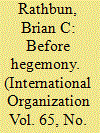

|
|
|
|
|
| Publication |
2011.
|
| Summary/Abstract |
Rationalist accounts of international cooperation maintain that states create international institutions to solve problems of distrust. They rest on a particular notion of trust, a strategic variety in which states trust based on information about others' interests. I seek to overturn this conventional wisdom. Drawing on social psychology, I point to the importance of generalized trust, an ideological belief about the trustworthiness of others in general. Generalized trust precedes institution-building and serves as a form of anarchical social capital, facilitating diffuse reciprocity and allowing state leaders to commit to multilateralism even in cases that rationalists deem inhospitable to cooperation and without the institutional protections that rationalists expect. In case studies of U.S. policy on the creation of the League of Nations and the United Nations, I demonstrate that generalized trust is necessary for explaining the origins of American multilateralism and the design of these organizations.
|
|
|
|
|
|
|
|
|
|
|
|
|
|
|
|
| 2 |
ID:
082833
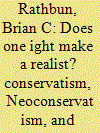

|
|
|
|
|
| Publication |
2008.
|
| Summary/Abstract |
Brian C. Rathbun looks at whether we can speak meaningfully of an ideological "right" in foreign policy. Through a brief historical review and an analysis of a survey of American political elites, he argues that there are in fact three ideological rights, bound together by an egoistic pursuit of the national interest but utilizing very different strategies
|
|
|
|
|
|
|
|
|
|
|
|
|
|
|
|
| 3 |
ID:
141815
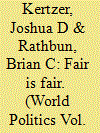

|
|
|
|
|
| Summary/Abstract |
Behavioral economics has shown that people often diverge from classical assumptions about self-interested behavior: they have social preferences and are concerned about issues of fairness and reciprocity. Social psychologists show that these preferences vary across actors, with some displaying more prosocial value orientations than others. Integrating a laboratory bargaining experiment with original archival research on Anglo-French and Franco-German diplomacy during the interwar period, the authors show how fairness and reciprocity matter in social interactions. That prosocials do not exploit their bargaining leverage to the degree that proselfs do helps explain why some pairs of actors are better able to avoid bargaining failure than others. In the face of consistent egoism on the part of negotiating partners, however, prosocials engage in negative reciprocity and adopt the same behaviors as proselfs.
|
|
|
|
|
|
|
|
|
|
|
|
|
|
|
|
| 4 |
ID:
113810
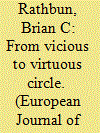

|
|
|
|
|
| Publication |
2012.
|
| Summary/Abstract |
Constructivists maintain that a shared identity was crucial for explaining the creation of the North Atlantic Treaty Organization and the multilateral form that it took. I challenge this view, arguing instead that the alliance was based on moralistic trust, the belief that others will live up to their moral obligations. Moralistic trust facilitates the initiation of cooperation, so that states can begin a virtuous circle of trust, collaboration, and enhanced trust. It is also the foundation of the diffuse reciprocity inherent to multilateralism. In two case studies of the domestic politics in the United States of making a multilateral security commitment to Europe, the first being the League of Nations, I demonstrate that identity was not a prominent consideration and did not lead individuals to embrace multilateralism. This social-psychological account improves upon constructivism and rationalism by offering a way to embed ideational variables in studies of strategic interaction.
|
|
|
|
|
|
|
|
|
|
|
|
|
|
|
|
| 5 |
ID:
172326


|
|
|
|
|
| Summary/Abstract |
Recent research into the public’s attitude toward the use of nuclear weapons repeats long-standing mistakes in how international relations theorists think about morality. Falsely equating consequentialism with state egoism and normative obligations with restrictions on the use of weapons of mass destruction implies that ethically motivated beliefs about foreign affairs must be other-regarding and that other-regarding behavior is not utilitarian in character. Drawing on empirical research into moral psychology, we argue that liberal, other-regarding morality is only one kind of ethical foundation. Alternative moral concerns such as retribution, deference to authority, and in-group loyalty also help to determine foreign policy beliefs. We find that all three are associated with support for the use of nuclear weapons in the American public. Our survey respondents act as moral utilitarians who weigh different ethical considerations in forming their judgments.
|
|
|
|
|
|
|
|
|
|
|
|
|
|
|
|
| 6 |
ID:
077420
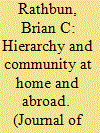

|
|
|
|
|
| Publication |
2007.
|
| Summary/Abstract |
Although there is increasing evidence of a relationship between domestic and foreign policy attitudes among American elites, we have less of an idea about why these sets of attitudes cohere. The answer lies in a better understanding of what we mean when we talk about "left" and "right" or "liberal" and "conservative." Drawing on the literature on rights theory, partisan cleavages, and ideological continua, I posit the existence of two core values, hierarchy and community, that should manifest themselves both at home and abroad. I perform a principal components analysis on data capturing both the domestic and foreign policy attitudes of American elites. The results indicate an almost identical structure of attitudes in both domains, indicating that it is generally inappropriate to distinguish between the two. Using factor scores in a series of logistic regressions, I demonstrate that support for community is most important for predicting support for humanitarian military operations, while hierarchy and community both help determine positions on strategic missions
|
|
|
|
|
|
|
|
|
|
|
|
|
|
|
|
| 7 |
ID:
153555
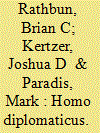

|
|
|
|
|
| Summary/Abstract |
Psychology is traditionally used in political science to explain deviations from rationality. Lost in the debate between rationalists and their critics, however, is a sense of whether the kinds of strategic self-interested behavior predicted by these models has psychological microfoundations: what would homo economicus look like in the real world? We argue that strategic rationality varies across individuals and is characterized by a pro-self social-value orientation and a high level of epistemic motivation. Testing our argument in the context of international relations, we employ a laboratory bargaining game and integrate it with archival research on German foreign policy-making in the 1920s. We find in both contexts that even among those interested in maximizing only their own egoistic gains, those with greater epistemic motivation are better able to adapt to the strategic situation, particularly the distribution of power. Our results build a bridge between two approaches often considered to be antithetical to one another.
|
|
|
|
|
|
|
|
|
|
|
|
|
|
|
|
| 8 |
ID:
097360
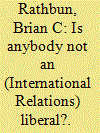

|
|
|
|
|
| Publication |
2010.
|
| Summary/Abstract |
While realism has recently been subjected to intense examination with regard to its theoretical coherence, liberalism-often thought to be the bookend to realism-has so far escaped such scrutiny. Liberalism is generally defined in one of two ways, each faulty. The first definition is in terms of the dependent variable as any argument that expects growing cooperation and progress in international affairs, understood as increased peace and prosperity, seizing for liberalism any independent variable found important for potentially promoting international cooperation. Second, liberalism is defined in terms of the units of analysis as any argument that disaggregates the state into smaller units. This equates liberalism with an entire level of analysis. This strategy of appropriation is inappropriate. Approaches to international relations need a core logic in order to justify the inclusion of particular independent variables or the use of a particular level of analysis. Since so many other paradigms also lay claim to those same entities, we are left wondering if anybody is not a liberal. Appropriation leads us to miss crucial distinctions between alternative explanations of the same outcomes, such as the "liberal" phenomena of the democratic peace and the transformative effects of international organizations.
|
|
|
|
|
|
|
|
|
|
|
|
|
|
|
|
| 9 |
ID:
103301
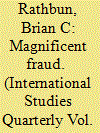

|
|
|
|
|
| Publication |
2011.
|
| Summary/Abstract |
This article seeks to overturn the conventional wisdom that World War II forced a decisive, bipartisan break in American grand strategy. As they had after World War I, American political elites debated the relative merits of unilateralism and multilateralism. Assessments of the relative costs and benefits of a cooperative and multilateral solution to American security depended on judgments about the likelihood of opportunism by America's partners. Democrats were more trusting than Republicans, expecting cooperation where the latter anticipated defection. This led to different preferences for the creation and design of the United Nations and the North Atlantic Treaty. Drawing on theories of "social orientation" and political ideology, I explain why the left is more trusting than the right. Rationalist accounts of the creation and design of the UN and NATO overstate the case for ideological convergence and therefore the importance of structure because they largely ignore behind-the-scene bipartisan consultations that allowed for a compromise prior to the votes on the respective treaties. My social psychological theory of international cooperation demonstrates that multilateralism is a dispositional trait, not a simple functional response to some objective security situation.
|
|
|
|
|
|
|
|
|
|
|
|
|
|
|
|
| 10 |
ID:
123394
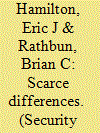

|
|
|
|
|
| Publication |
2013.
|
| Summary/Abstract |
A divide has opened up between offensive and defensive realism as to the relative scarcity of security in the international system, with powerful implications for the vision each approach offers about the nature of international politics. Yet we still do not understand why the two diverge given their common neorealist foundations. This article reviews implicit, explicit, and other potential explanations of that difference-the relationship between power and security, the offense-defense balance, the prevalence and efficiency of balancing vs. bandwagoning, and the role played by uncertainty in decision-making-and finds them lacking in their ability to provide an adequate account that is systemic and structural in nature, does not violate arguments the scholars have made in practice, and does not confuse cause with effect. Finding prior efforts lacking, this article proposes that the distinction could be logically rooted in material scarcity, a familiar theme in realism historically that has been ignored in more recent formulations. Drawing a distinction between a "dangerous world" in which uncertainty is the core problem and a "competitive world" in which scarcity bedevils state relations helps explain where offensive and defensive realism both diverge and converge.
|
|
|
|
|
|
|
|
|
|
|
|
|
|
|
|
| 11 |
ID:
146188


|
|
|
|
|
| Summary/Abstract |
Previous research shows that, when it comes to foreign policy, individuals have general orientations that inform their beliefs toward more specific issues in international relations. But such studies evade an even more important question: what gives rise to such foreign-policy orientations in the first place? Combining an original survey on a nationally representative sample of Americans with Schwartz's theory of values from political psychology, we show that people take foreign policy personally: the same basic values that people use to guide choices in their daily lives also travel to the domain of foreign affairs. Conservation values are most strongly linked to “militant internationalism,” a general hawkishness in international relations. The value of universalism is the most important value for predicting “cooperative internationalism,” the foreign-policy orientation marked by a preference for multilateralism and cosmopolitanism in international affairs. This relatively parsimonious and elegant system of values and foreign-policy beliefs is consistent across both high- and low-knowledge respondents, offering one potential explanation for why those people who are otherwise uninformed about world politics nonetheless express coherent foreign-policy beliefs.
|
|
|
|
|
|
|
|
|
|
|
|
|
|
|
|
| 12 |
ID:
156205
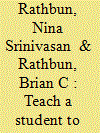

|
|
|
|
|
| Summary/Abstract |
American higher-education institutions are under increasing pressure to prepare their students with practical skills for the workplace, and the social sciences—including political science—are not immune. Political figures have suggested—sometimes seconded by academics themselves—that research distracts academics from imparting practical skills to undergraduate students. Using a survey of international relations (IR) scholars, this article shows that this is not the case. Those who spend more time on research actually devote more time to policy-relevant research in their courses than more abstract and theoretical work, and they incorporate more contemporary issues. Research seems to encourage academics to teach their students to fish.
|
|
|
|
|
|
|
|
|
|
|
|
|
|
|
|
| 13 |
ID:
078836
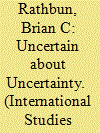

|
|
|
|
|
| Publication |
2007.
|
| Summary/Abstract |
The force of uncertainty is central to every major research tradition in the study of international relations. Yet uncertainty has multiple meanings, and each paradigm has a somewhat unique understanding of it. More often than not, these meanings are implicit. I argue that realists define uncertainty as fear induced by anarchy and the possibility of predation; rationalists as ignorance (in a nonpejorative sense) endemic to bargaining games of incomplete information and enforcement; cognitivists as the confusion (again nonpejoratively) of decision making in a complex international environment; and constructivists as the indeterminacy of a largely socially constructed world that lacks meaning without norms and identities. I demonstrate how these different understandings are what provide the necessary microfoundations for the paradigms' definitions of learning, their contrasting expectations about signaling, and the functions provided by international organizations. This has conceptual, methodological, and theoretical payoffs. Understanding uncertainty is necessary for grasping the logic of each paradigm, for distinguishing them from each other, and promoting interparadigmatic communication
|
|
|
|
|
|
|
|
|
|
|
|
|
|
|
|
|
|
|
|
|